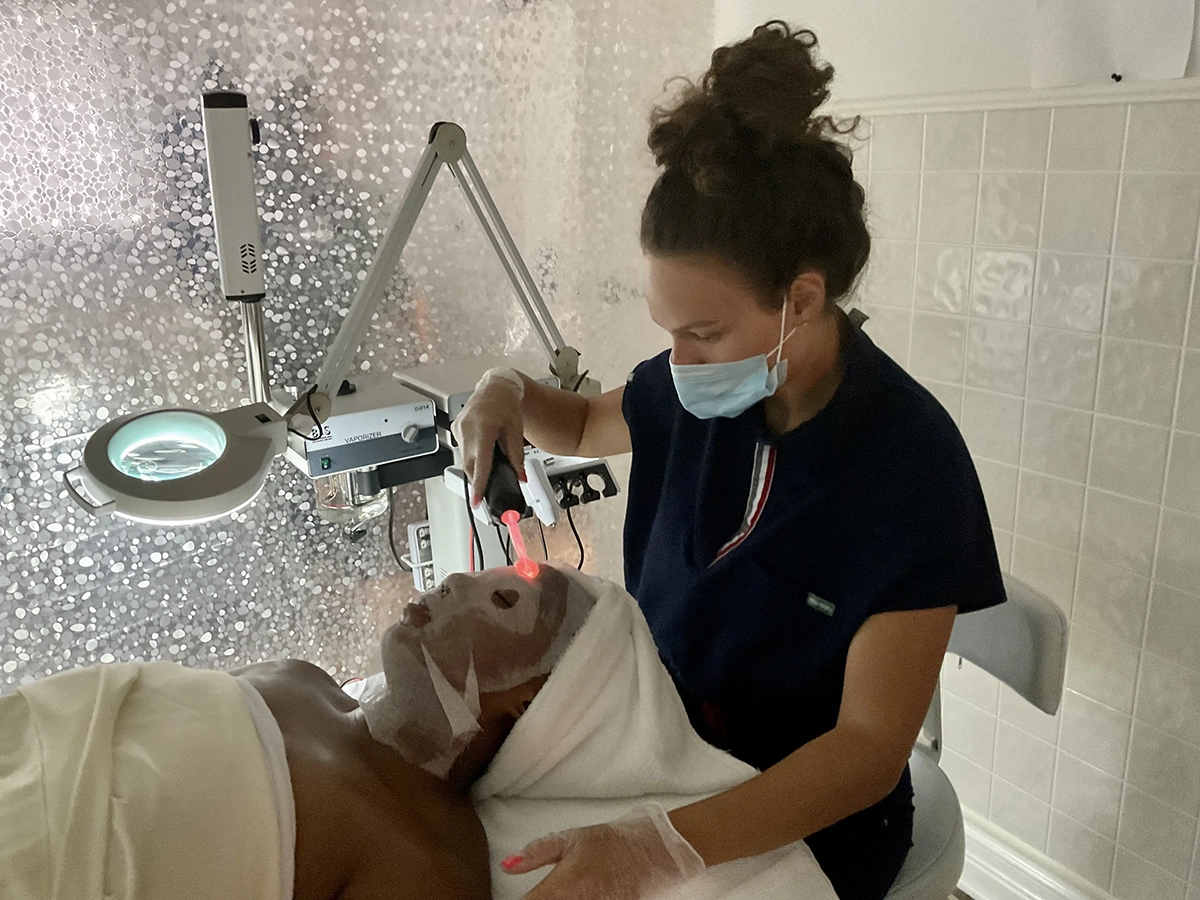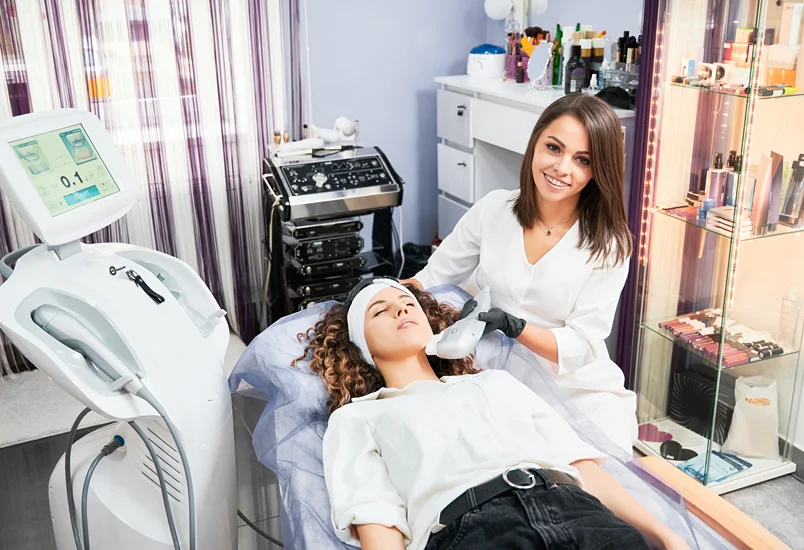How to Become an Esthetician: Your Beauty Career Awaits!
To become an esthetician, you must complete a state-approved esthetician program and obtain a license. These programs typically cover skincare techniques, makeup application, and business management.
Additionally, you may need to pass a written and practical exam to earn your license. Becoming an esthetician can provide a rewarding career helping others enhance their skin and overall appearance. It is a profession that requires a passion for skincare and beauty, as well as strong interpersonal skills to communicate effectively with clients.
With the right education and dedication, you can pursue a successful career as an esthetician.
The Allure Of A Beauty Career
Becoming an esthetician offers a pathway to a rewarding career in the beauty industry. With a focus on skincare, makeup, and overall wellness, this profession provides a platform to unleash your creativity and passion for helping others look and feel their best.
Why Choose Esthetics?
- Opportunity to express creativity
- Help clients boost their confidence
- Flexible work environments
- Continuous learning and skill development
Growth In The Beauty Industry
The beauty industry is experiencing rapid growth, creating a high demand for skilled estheticians. As beauty trends evolve and self-care becomes a priority for many, the need for knowledgeable professionals in skincare and beauty treatments continues to rise.

Credit: newagespainstitute.com
Esthetician: The Role Defined
Embarking on the path to becoming an esthetician involves completing a state-approved training program, honing skills in skincare treatments, and obtaining a license. Estheticians specialize in providing facial and body treatments to enhance clients’ skin health and appearance.
Daily Responsibilities
An esthetician is a skincare specialist who helps clients look and feel their best through a variety of treatments. They provide services such as facials, waxing, and body treatments. A typical day for an esthetician includes greeting clients, evaluating their skin and recommending treatments, performing skincare services, and maintaining a clean and organized workspace.
Specializations Within Esthetics
There are several specializations within the field of esthetics. Some estheticians choose to specialize in a specific area, such as makeup application or laser hair removal. Others may focus on treating specific skin conditions like acne or rosacea. Estheticians who work in medical settings may also provide pre- and post-operative care for patients undergoing cosmetic procedures. Aspiring estheticians can choose to pursue additional training in a specialization that interests them. This can help them develop the skills and knowledge needed to provide more advanced services and better serve their clients. Overall, becoming an esthetician requires a passion for skincare and a dedication to helping others look and feel their best. With the right training and experience, you can build a rewarding career in this exciting field.
Educational Pathways
When considering a career in esthetics, it’s important to understand the educational pathways available to pursue this rewarding profession. Obtaining the necessary education and training is crucial to becoming a successful esthetician. In this article, we will explore the key components of the educational journey for aspiring estheticians, including choosing the right school and the key courses and skills that will help you excel in this field.
Choosing The Right School
Choosing the right school is a critical step in your journey to becoming an esthetician. It’s essential to find an accredited institution that offers comprehensive esthetics programs. Consider factors such as the school’s reputation, curriculum, faculty expertise, and the resources available to students.
Here are a few key factors to consider when selecting an esthetics school:
- Accreditation: Ensure that the school is accredited by a recognized accrediting body. This ensures that the curriculum meets industry standards and that you will receive a quality education.
- Curriculum: Look for a school that offers a well-rounded curriculum covering a wide range of esthetics topics, including skincare, facials, makeup application, hair removal techniques, and more.
- Faculty: Research the qualifications and experience of the school’s faculty members. Experienced instructors with industry knowledge can provide valuable insights and guidance throughout your educational journey.
- Facilities and Resources: Visit the school if possible to assess the facilities and resources available to students. A well-equipped esthetics lab and access to modern tools and equipment can enhance your learning experience.
Key Courses And Skills
During your esthetics education, you will gain knowledge and skills in various areas that are essential for success in the field. Here are some key courses and skills to focus on:
| Key Courses | Key Skills |
|---|---|
|
|
Mastering these courses and skills will equip you with the necessary knowledge and expertise to provide top-notch esthetic services to clients. Additionally, it’s important to stay updated with the latest industry trends and advancements through continuous education and professional development.
Licensing Requirements
If you are interested in becoming an esthetician, there are a few important licensing requirements you will need to fulfill. Estheticians are professionals who work in the beauty and skincare industry, providing a variety of services such as facials, waxing, and makeup application. To become a licensed esthetician, you will need to meet certain state-specific criteria and pass a licensing exam. In this article, we will explore the licensing requirements for becoming an esthetician and provide tips on how to prepare for your exam.
State-specific Criteria
Each state has its own specific criteria for becoming a licensed esthetician. These criteria usually include completing a certain number of hours of training at an accredited esthetician school. In some states, you may also be required to complete an apprenticeship or work under the supervision of a licensed esthetician before being eligible to take the licensing exam.
Other state-specific criteria may include:
- Minimum age requirements
- Criminal background checks
- Proof of liability insurance
- Continuing education requirements
Preparing For Your Exam
Once you have completed the required training and met the state-specific criteria, you will need to pass a licensing exam. This exam usually consists of both a written and practical component, testing your knowledge of esthetician procedures and techniques.
Here are some tips to help you prepare for your exam:
- Study regularly and review your notes frequently.
- Practice on friends and family to hone your skills.
- Take practice exams to get a feel for the types of questions you will be asked.
- Get plenty of rest the night before your exam to ensure you are alert and focused.
- Arrive early to your exam location to give yourself time to relax and mentally prepare.
By following these tips and staying focused on your goals, you can successfully fulfill the licensing requirements and become a licensed esthetician.
Building Your Experience
Building your experience is essential for a successful career as an esthetician. Gaining practical skills through internships, apprenticeships, and volunteering opportunities can provide invaluable hands-on experience and exposure to different areas of the field. These experiences not only enhance your technical abilities but also allow you to build a professional network and gain insight into the day-to-day operations of the industry.
Internships And Apprenticeships
Internships and apprenticeships offer aspiring estheticians the chance to work alongside experienced professionals in a real-world setting. These programs provide hands-on training in various aspects of skincare, including facials, waxing, and body treatments. By learning directly from seasoned estheticians, you can acquire practical skills, industry-specific knowledge, and a deeper understanding of client interactions.
Volunteering Opportunities
Volunteering in community events, health fairs, or wellness programs can expose you to diverse client populations and expand your skill set. Through volunteering, you can practice your techniques, develop customer service skills, and gain confidence in your abilities. Additionally, volunteering allows you to contribute to the community while refining your craft and establishing a positive reputation in the industry.
Crafting Your Resume
To become an Esthetician, craft a tailored resume highlighting skincare expertise, certifications, and customer service skills. Showcase your passion for beauty and dedication to helping clients achieve healthy, glowing skin. Stand out by emphasizing hands-on experience and training in various skincare treatments.
Highlighting Relevant Experience
When crafting your resume as an esthetician, it’s essential to highlight your relevant experience. This will help potential employers quickly identify your skills and qualifications. Start by listing your previous work experience, focusing on any roles that directly relate to the field of esthetics. Include the name of the company, your job title, and the dates of employment.
For each position, provide a brief description of your responsibilities using action verbs to showcase your accomplishments. Be sure to emphasize any experience you have in performing skincare treatments, such as facials, chemical peels, or microdermabrasion. Mention any specialized training or certifications you have obtained, such as in laser hair removal or advanced facial techniques.
Tips For A Standout Application
When it comes to creating a standout application, attention to detail is key. Here are some tips to make your resume shine:
- Keep it concise: Aim for a one-page resume that highlights your most relevant experience and skills.
- Use a clean and professional design: Opt for a simple and easy-to-read format with a professional font.
- Showcase your skills: Include a section that highlights your technical skills, such as knowledge of skincare products, equipment, and treatment techniques.
- Quantify your achievements: Whenever possible, use numbers or percentages to showcase your accomplishments. For example, mention the number of clients you served or the percentage of improvement in their skin condition.
- Include a professional summary: Start your resume with a brief summary that highlights your key qualifications and career goals.
- Proofread for errors: Double-check your resume for any grammatical or spelling mistakes. Attention to detail is crucial in the field of esthetics.
By following these tips and tailoring your resume to the specific requirements of the esthetician position you’re applying for, you’ll increase your chances of standing out from the competition and securing an interview.
Landing Your First Job
After completing your esthetician training, it’s time to focus on landing your first job. Use these strategies to kickstart your career:
Job Search Strategies
- Update your resume with relevant skills and experience.
- Network with industry professionals for job leads.
- Utilize online job boards and social media for opportunities.
Ace The Interview
- Research the company to show your interest.
- Dress professionally and arrive early for the interview.
- Practice common interview questions to prepare.

Credit: facemedstore.com
Continuing Education And Growth
Continuing Education and Growth are crucial for estheticians to stay competitive in the beauty industry. Staying current with the latest trends and obtaining relevant certifications are essential for career advancement.
Staying Ahead With Trends
Estheticians must follow industry trends like skincare innovations and popular treatments.
Certifications For Advancement
Obtaining specialized certifications can lead to higher paying jobs and increased opportunities.

Credit: m.youtube.com
Frequently Asked Questions
What Is The Role Of An Esthetician?
An esthetician is a skincare specialist who provides various beauty treatments and skincare services to clients, including facials, hair removal, and makeup application. They also educate clients on proper skincare routines and recommend products to improve skin health.
How Long Does It Take To Become An Esthetician?
Becoming an esthetician typically requires completing a state-approved cosmetology or esthetician program, which can take around 6 to 12 months. After completing the program, individuals must pass a state licensing exam to practice professionally.
What Are The Key Skills Needed To Succeed As An Esthetician?
Successful estheticians possess strong interpersonal skills, attention to detail, knowledge of skincare products and techniques, and the ability to tailor treatments to individual client needs. Additionally, business acumen and the ability to stay updated on industry trends are essential for success in this field.
Conclusion
Pursuing a career as an esthetician can be a rewarding and fulfilling path. By following the necessary steps and obtaining the right training, you can enter this exciting field and help people look and feel their best. With dedication and passion, you can thrive in the esthetics industry.

